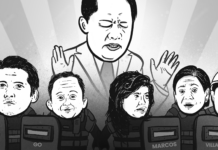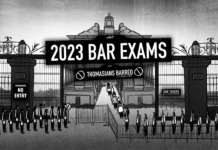“DO NO injustice, suffer no injustice,” proclaims the Aegis Juris of the UST Faculty of Civil Law in its official seal that is represented by the shield of justice. With the brutal death of neophyte Horacio Tomas Castillo III allegedly from hazing, the motto has been exposed as nothing but mockery and hypocrisy.
Castillo, 22, had been set to attend on Sept. 17 the “welcome ceremonies” for new members of Aegis Juris, and he had allayed his parents’ concern by saying the fraternity was recognized by the law school and even counted the dean, Nilo Divina, as an alumnus.
Since hazing is outlawed and Aegis Juris consists of aspiring lawyers if not full-fledged members of the bar, the fraternity should be devoted to the rule of the law. But Castillo and his parents were proven wrong.
Despite being a fraternity of law students and law professionals, Aegis Juris seems to have considered itself above the law, even ready to undermine it. And it has proven its case by severely manhandling Castillo, beating him to a pulp and dumping his lifeless body in a Tondo alley like any victim of summary execution. Is this how a fraternity should treat a member? Is this how a brotherhood should operate?
The lawlessness and injustice that Aegis Juris has exhibited contrary to its name and claims, contrast with the avowals and ideals not only of the country’s oldest law school but also of the country’s oldest university, which also happens to be THE Catholic University of the Philippines.
UST stands for a host of ideals, and some of those may be particularly relevant in this case: peace, justice, and the sanctity of life. All of these are not only compromised but totally contradicted by the death of Castillo. The death by hazing perpetrated by the Aegis Juris should indicate that all the contrary values have thrived on campus: against peace, there’s violence; against justice, injustice; and against life, death.
During the debate on the reproductive health law several years back, the Varsitarian was practically alone on campus in upholding the culture of life versus the culture of death that it claimed was being cultivated by those who support the social-engineering measure of distributing contraceptives and birth-control pills and devices for free to women in the name of population control and “reproductive health.”
The middle-class sensibilities of supposedly educated Filipino did not care if many of the devices were abortifacients; at the prospect of “overpopulation” of poor people, such sensibilities would go for contraception and even abortion. Anything seen to hamper progress and development should be neutralized or contracepted.
Human ambition and drive to progress should not be delayed by considerations of values and humanity. The culture of death is alive and well in the country: it is the culture of the jungle, governed by the primitive rule of survival of the fittest.
Nowadays, many on campus, even faculty members, clergy, and religious, subtly or not too subtly approve of the strong-arm tactics of President Duterte in checking the drug problem, a movement characterized by a vastly increasing number of extra-judicial killings fueled by hate speech and vicious demagoguery by the President and his followers themselves.
Such murderous tactics are supported by the “educated” middle-class, including some sectors in “Catholic” UST, which should know better and whose conduct and thinking should be governed by the simple but stark biblical injunction, “Thou shalt not kill.”
We’re sure that Castillo had applied for membership lured by the prospect of making it in his law studies by being attached to a fraternity that had a reputation for being a “lawyers factory,” a claim proudly touted by the Aegis Juris itself. And fraternity elders sought to make sure that Castillo deserved the membership. Since the elders themselves underwent hazing, they made sure Castillo should suffer the same fate. He was subjected to the rule of the jungle; he underwent primitive violence. He fell short of the rule so his body was dumped.
In the same way, in 2001, Mark Welson Chua fell short of the rule set up by the old-boy-network of military bossism in the Reserved Officers Training Corps (ROTC). Like lawyers and their frats, soldiers and their military exclusivism have seen excesses of blind loyalty and obedience, even to the point of murder: such an instance was proven in the case of Chua, whose body was later fished out of the Pasig, his mouth gagged by industrial tape. Many of those behind the killing were sons of police and military officers and were convicted in absentia; they’re still at large.
Meanwhile Duterte has restored by mere executive fiat compulsory ROTC, which had been abolished by law. And none from UST, which had led the campaign to have that law enacted in 2003, is protesting.
Thus, the culture of death has been thriving on campus all along, fueled by blind ambition, greed and careerism, and by sheer middle-class apathy, mediocrity, and faintheartedness. While making the usual exhortation that justice be served so that Castillo’s death would not be for naught, let us also make this sad episode the wake-up call for a timely accounting of the values we hold dear as a Catholic institution, and whether we have cherished and upheld them not only in speech and thought but most important in deed.
















I don’t mean to sound disrespectful to the writer or to the Varsi as a whole, but why do I feel like this article is painted with emotions when journalism is about objectivity? I thought journalism is about laying down the facts, letting these sit and speak for themselves, and letting the people decide based on these facts. I didn’t think journalism was also meant to inspire action based on what the writer feels is right. Then, that would make the writer the righter. Right?
First off I would like to say excellent blog! I had a quick question that I’d like to ask if you don’t mind.
I was interested to know how you center yourself and clear your head before
writing. I have had a difficult time clearing my mind in getting my ideas out there.
I truly do take pleasure in writing however
it just seems like the first 10 to 15 minutes are usually lost just trying to figure out how to begin. Any suggestions or tips?
Appreciate it!